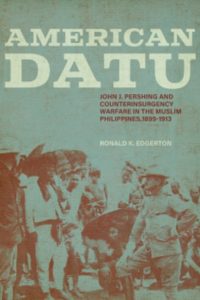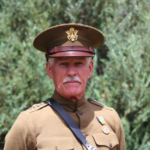AMERICAN DATU by Ron Edgerton (Philippines)
An interesting look into Gen. John J. Pershing’s time in the Philippines
Greeley resident Ron Edgerton recently penned the biography “American Datu” which highlights John J. Pershing’s military campaigns in the Philippines.
By TAMARA MARKARD | tmarkard@greeleytribune.com |
Greeley CO Tribune
July 16, 2020
 Fans of the history of war have the opportunity to learn unique stories about Gen. John J. “Black Jack” Pershing through a new book penned by University of Northern Colorado professor emeritus of history Ron Edgerton.
Fans of the history of war have the opportunity to learn unique stories about Gen. John J. “Black Jack” Pershing through a new book penned by University of Northern Colorado professor emeritus of history Ron Edgerton.
“American Datu,” released May 19, looks at the part Gen. John J. Pershing had on creating counterinsurgency methods used by U.S. officers as well as his time in the Philippines.
The U.S. Government Counterinsurgency Guide, publish in January 2009, defines counterinsurgency as “comprehensive civilian and military efforts taken to simultaneously defeat and contain insurgency and address its root causes.”
Many times these actions are taken against the activities of guerrillas or revolutionaries trying to gain power in a specific region, country or over a certain population.
Edgerton first became interested in Pershing’s time in the country when he was stationed in the Philippines while serving in the Peace Corps.
“While I was there I kept hearing about this long war the United States had with Muslims in Mindanao,”’ Edgerton explained. “About 10% of the Philippine population is Muslim, the rest are either Christian or Animist.”
The war took place between 1899 and 1913 and consisted of fighting between U.S. soldiers and the Moro, or Muslim people of the country.
“That story really hasn’t been told very much, which is strange because here we are fighting militant Muslims in Afghanistan,” Edgerton said. “And here 100 years before we were engaged over a decade-long sustained military encounter with Muslims in the Philippines.”
As he poked more into the story, Edgerton learned that Pershing was stationed on Mindanao to fight Muslims.
Pershing is best known for being a commanding general of American Expeditionary Forces in France during World War I.
“What I discovered was that this was really the most creative time in his life,” Edgerton explained. “He was younger and got interested in these people; got interested in the task he was given which was counterinsurgency warfare.

Ron Edgerton poses as General Pershing, the character he performed as during the High Plains Chautauqua on Aug. 2, 2018. (Greeley Tribune file photo)
“And he just became immersed in that,” he added.
Pershing spent 7 years fighting, pacifying and then becoming a military governor of the Moros in the Philippines. Pershing learned the language and culture, earning the respect and friendship of many Moro leaders and community members.
“What you can do by knowing the culture, knowing the terrain and knowing all those things is that you can extend your chances of being successful,” Edgerton said. “You maximize the people among them that become your supporters. If you are going to do that, you can’t push them on certain things like slavery or polygamy. You de-emphasize that, you just go along with it and it’s a very controversial thing.”
Throughout the book, Edgerton compares what military manuals today say about the technique compared to what Pershing “had to go on back then” which was to take what the military learned from fighting Native Americans.
“This fraught and fascinating biography of Pershing in the Philippines gives a glimpse of the voices of Filipino Muslims as they engaged the governing American military officers,” Patricio N. Abinales, co-author of “State and Society of the Philippines” said. “It also establishes Pershing’s tactics as the forerunner of today’s counterinsurgency associated with former General David Petraeus.”
Pershing’s story also has a local connection, Edgerton said. Pershing married the daughter of Sen. Frances Warren of Wyoming and would come through Greeley on the train to visit his wife and in-laws in Cheyenne.
“It’s a fun story, I enjoyed doing it. I think there’s an interest here with Pershing’s connection with the Warren Family and here in Greeley,” Edgerton said excitedly. “I hope people enjoy reading the book. I’m very happy with it.”
The title “American Datu” is a nod to Pershing’s work as a military governor over the Moros. The word “datu” in the Philippines means chief or chieftain.
Edgerton’s interest in Pershing has also been seen in his work with the Chautauqua program. In 2018, Edgerton portrayed the general in a performance under the large white tent. He wanted to be as authentic as possible and grew a mustache for the role.
“It was the most frightening moment of my life. Eight hundred friends, Greeley-ites, people I look up to and admire all there,” Edgerton said, laughing. “I’m not an actor, but I held forth and Greeley audiences can be very forgiving and generous.”
“It didn’t start a new career for me, but it was fun,” he quipped.
Edgerton has also written People of the Middle Ground: A Century of Conflict and Accommodation in Central Mindanao, 1880-1980s.
It surprises me that some current posts while “historical” are directed to a Peace corps site.
Why is PEACECORPSWORLDWIDE.ORG publishing something like this?
Military publications should be directed to another place where they may be properly vetted.
Thanks Ed for your comment.
It was posted because the writer was a former Peace Corps Volunteer. Marian and I began this website to promote the writers who were PCVs and who were writing about the countries where they were Volunteers. We publish reviews, do interviewers, and promote when we can the books of fiction, non-fiction, poetry, etc. all written by RPCVs. That is why Ron’s book is on our site. Thanks. John
• PEACE IN EVERY BREATH
• peace is a place
• we need to fill now
• while we can.
• We didn’t invent ourselves
• back down that long
• winding longing line.
• We had been seeking to be a
• people from our beginnings.
• Will we end here now?
• Can our toil and struggle
• re-arc the bridge hope
• and re-make the rainbow?
•
•
(C) copyright Edward Mycue
In the final stanza, first line change the last 2 words to “struggle” (from “our fight”).
• PEACE IN EVERY BREATH
• peace is a place
• we need to fill now
• while we can.
• We didn’t invent ourselves
• back down that long
• winding longing line.
• We had been seeking to be a
• people from our beginnings.
• Will we end here now?
• Can our toil and struggle
• re-arc the bridge hope
• and re-make the rainbow?
(C) copyright Edward Mycue 21 VII 2020 REVISION